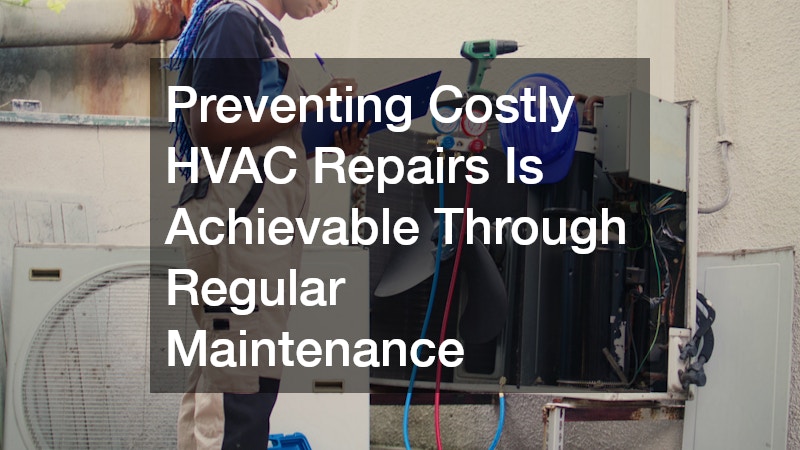Maintaining your HVAC system effectively can significantly reduce the need for expensive repairs. Regular maintenance not only ensures your system operates efficiently but also extends its lifespan. In this article, we will explore practical steps to avoid costly HVAC repairs, helping you save money and keep your home comfortable year-round.
1. Schedule Regular Maintenance
Regular maintenance is crucial to the longevity and efficiency of your HVAC system. Experts recommend scheduling a professional inspection at least twice a year, ideally before the start of the cooling and heating seasons.
During these inspections, technicians can identify potential issues before they escalate into more serious problems that require costly HVAC repairs.
A thorough inspection typically includes checking the system’s electrical components, refrigerant levels, and ensuring that all parts are in good working condition. By addressing minor issues promptly, you can prevent major malfunctions that lead to costly downtime and repairs. Routine maintenance can also identify outdated components that may need upgrading to improve the system’s efficiency.
One fact to consider is that neglecting maintenance can reduce your system’s efficiency by up to 5% annually. This not only increases energy bills but strains your system, leading to breakdowns and expensive HVAC repairs. Therefore, investing in regular maintenance is a cost-effective strategy to keep your system running smoothly.
2. Change Air Filters Regularly
Air filters play a vital role in ensuring your HVAC system operates smoothly by trapping dust, pollen, and other airborne particles. Dirty or clogged filters can hinder airflow and reduce the system’s efficiency, potentially leading to overheating and failure. It’s recommended to check and replace air filters every 1-3 months, depending on the type of filter and the level of dust in your home.
Using high-efficiency filters can enhance indoor air quality while also protecting the internal components of your HVAC system. When filters are clean, your system doesn’t have to work as hard to circulate air, which reduces wear and tear. Keeping your filters clean is a simple and effective way to prevent costly HVAC repairs in the future.
Failing to change air filters regularly may also contribute to bigger issues, such as a frozen evaporator coil. This can occur due to restricted airflow and lead to a complete system shutdown, necessitating an expensive repair. By keeping a close eye on your air filters, you can save on the costs associated with major HVAC repairs.
3. Keep Outdoor Units Clear
Your HVAC system’s outdoor units require adequate space to function efficiently. Obstructions like leaves, dirt, and debris can block airflow and overheat the motor, resulting in system strain and eventual breakdown. Ensuring the area around the outdoor unit is clear of vegetation and other obstacles is a simple yet effective preventive measure.
It’s important to check for any signs of animal nests or damage from harsh weather conditions. Regularly cleaning and inspecting the outdoor unit helps maintain optimal functioning and prevents the need for costly HVAC repairs. Keeping the condenser coils clean also improves efficiency and prolongs the unit’s lifespan.
For those living in regions with heavy snowfall or frequent storms, investing in protective covers can shield the unit from extreme weather, thus reducing potential damage. By maintaining a clear and protected outdoor unit, you can ensure your HVAC system remains efficient and avoid unnecessary expenses related to HVAC repairs.
4. Monitor System for Signs of Trouble
Being proactive about monitoring your HVAC system can alert you to potential problems before they escalate. Listen for unusual noises, such as grinding or squealing, which can indicate mechanical issues. Strange odors, like burning smells, could signal an electrical problem or overheating component.
Observing fluctuations in your energy bills can also provide insight into your system’s performance. If you notice a sudden increase without a change in usage, it may be time to have your system checked to avoid more significant HVAC repairs. Monitoring the performance allows you to act quickly and prevent breakdowns.
Lastly, pay attention to any variations in the airflow or inconsistent temperatures in different areas of your home. These could indicate ductwork issues or failing components that need immediate attention. Monitoring your HVAC system closely ensures you’re aware of its condition and can address minor issues before they result in costly repairs.
Preventing costly HVAC repairs is achievable through regular maintenance, monitoring system performance, and making simple routine checks. By being proactive, you can ensure your system operates efficiently and lasts longer, saving you time, stress, and money. Implement these practical tips to maintain your HVAC system and enjoy a comfortable and worry-free living environment.





